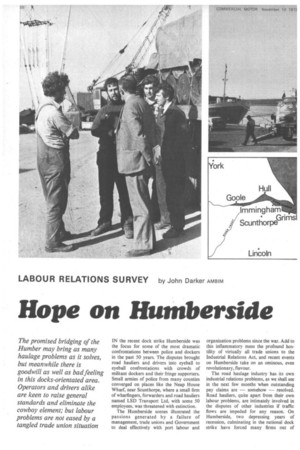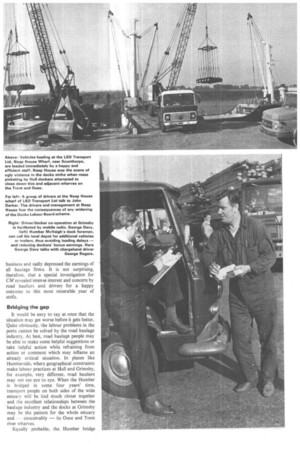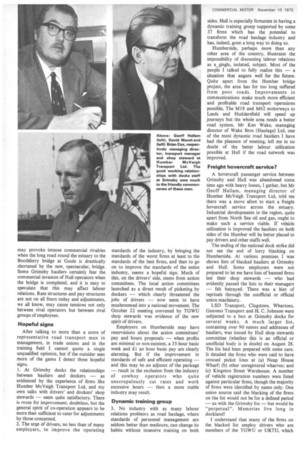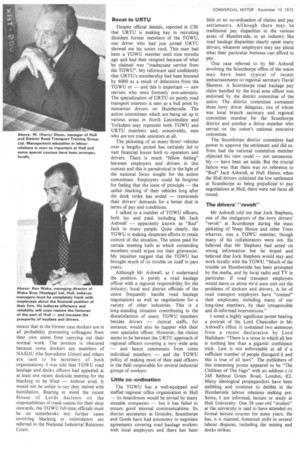LABOUR RELATIONS SURVEY by John Darker AMBIM
Page 52

Page 53

Page 54

Page 56

If you've noticed an error in this article please click here to report it so we can fix it.
Hope on Humberside
The promised bridging of the Humber may bring as many haulage problems as it solves, but meanwhile there is goodwill as well as bad feeling in this docks-orientated area. Operators and drivers alike are keen to raise general standards and eliminate the cowboy element; but labour problems are not eased by a tangled trade union situation
IN the recent dock strike Humberside was the focus for some of the most dramatic confrontations between police and dockers in the past 50 years. The disputes brought road hauliers and drivers into eyeball to eyeball confrontations with crowds of militant dockers and their fringe supporters. Small armies of police from many counties converged on places like the Neap House Wharf, near Scunthorpe, where a small firm of wharfingers, forwarders and road hauliers named LSD Transport Ltd, with some 50 employees, was threatened with extinction.
The Humberside scenes illustrated the passions generated by a failure of management, trade unions and Government to deal effectively with port labour and organization problems since the war. Add to this inflammatory mess the profound hostility of virtually all trade unions to the Industrial Relations Act, and recent events on Humberside take on an ominous, even revolutionary, flavour.
The road haulage industry has its own industrial relations problems, as we shall see in the next few months when outstanding pay claims are — somehow — resolved. Road hauliers, quite apart from their own labour problems, are intimately involved in the disputes of other industries if traffic flows are impeded for any reason. On Humberside, two depressing years of recession, culminating in the national dock strike have forced many firms out of business and sadly depressed the earnings of all haulage firms. It is not surprising, therefore, that a special investigation for CM revealed intense interest and concern by road hauliers and drivers for a happy outcome to this most miserable year of strife.
Bridging the gap It would be easy to say at once that the situation may get worse before it gets better. Quite obviously, the labour problems in the ports cannot be solved by the road haulage industry. At best, road haulage people may be able to make some helpful suggestions or take helpful action while refraining from action or comment which may inflame an already critical situation. In places like Humberside, where geographical constraints make labour practices at Hull and Grimsby, for example, very different, road hauliers may not see eye to eye. When the Humber is bridged in some four years' time, transport people on both sides of the wide estuary will be tied much closer together and the excellent relationships between the haulage industry and the docks at Grimsby may be the pattern for the whole estuary and --conceivably — its Ouse and Trent river wharves.
Equally probable, the Humber bridge may provoke intense commercial rivalries when the long road round the estuary to the Boothferry bridge at Goole is drastically shortened by the new, spectacular, bridge. Some Grimsby hauliers certainly fear the commercial invasion of Hull operators when the bridge is completed, and it is easy to speculate that this may affect labour relations. Rate structures and pay structures are not on all fours today and adjustments, we all know, may cause tensions not only between rival operators but between rival groups of employees.
Hopeful signs After talking to more than a score of representative road transport men in management, in trade unions and in the training field I cannot quote a single unqualified optimist, but if the outsider sees more of the game I detect three hopeful signs.
I. At Grimsby docks the relationships between hauliers and dockers — as evidenced by the experience of firms like Humber McVeigh Transport Ltd, and my own talks with drivers' and dockers' shop stewards — seem quite satisfactory. There is room for improvement, doubtless, but the general spirit of co-operation appears to be more than sufficient to cater for adjustments by those concerned.
2. The urge of drivers, no less than of many employers, to improve the operating standards of the industry, by bringing the standards of the worst firms at least to the standards of the best firms, and then to go on to improve the standards of the entire industry, seems a hopeful sign. Much of this, on the drivers' side, stems from action committees. The local action committees launched as a direct result of picketing by dockers — which clearly threatened the jobs of drivers — now seem to have mushroomed into a national movement. The October 22 meeting convened by TGWU shop stewards was evidence of the new spirit of drivers.
Employers on Humberside may have reservations about the action committees' pay and hours proposals — when profits are minimal or non-existent, a 35-hour basic week and Ll an hour basic pay are clearly alarming. But if the improvement in standards of safe and efficient operating — and this may be an adjunct of the package — result in the exclusion from the industry of cowboy operators who quite unscrupulously cut rates and work excessive hours then a more stable industry may result.
Dynamic training group 3. No industry with as many labour relations problems as road haulage, where standards of personnel management are seldom better than mediocre, can change its habits without intensive training on both sides. Hull is especially fortunate in having a dynamic training group supported by some 37 firms which has the potential to transform the road haulage industry . and has, indeed, gone a long way to doing so.
Humberside, perhaps more than any other area of the country, illustrates the impossibility of discussing labour relations as a_ single, isolated, subject. Most of the people I talked to fully realize this — a situation that augurs well for the future. Quite apart from the Humber bridge project, the area has for too long suffered from poor roads. Improvements in communications make much more efficient and profitable road transport operations possible. The M18 and M62 motorways to Leeds and Huddersfield will speed up journeys but the whole area needs a better road system. Mr Ken Wake, managing director of Wake Bros (Haulage) Ltd, one of the most dynamic road hauliers I have had the pleasure of meeting, left me in no doubt of the better labour utilization possible at Hull if the road network was improved.
Freight hovercraft service?
A hovercraft passenger service between Grimsby and Hull was abandoned some time ago with heavy losses, I gather, but Mr Geoff Hallam, managing director of Humber McVeigh Transport Ltd, told me there was a move afoot to start a freight hovercraft service across the estuary. Industrial developments in the region, quite apart from North Sea oil and gas, ought to make such a service viable. If vehicle utilization is improved the hauliers on both sides of the Humber will be better placed to pay drivers and other staffs well.
The ending of the national dock strike did not see the end of lorry blacking on Humberside. At various premises I was shown lists of blacked hauliers at Grimsby and Hull. Some employers were not prepared to let me have lists of banned firms lest their shop stewards — who had evidently passed the lists to their managers — felt betrayed.. There was a hint of reprisals through the unofficial or official union machinery.
LSD Transport, Clugstons, Whartons, Gunness Transport and H. C. Johnson were subjected to a ban at Grimsby docks for several weeks. A much larger list, containing over 90 names and addresses of hauliers, was issued by Hull shop stewards committee (whether this is an official or unofficial body is in doubt) on August 28. The list had been prepared with some care. It detailed the firms who were said to have crossed picket lines at (a) Neap House Wharf; (b) other unregistered wharves; and (c) Kingston Street Warehouse. A number of vehicle registration numbers were listed against particular firms, though the majority of firms were identified by name only. One union source said the blacking of the firms on the list would not be for a defined period — as with the Grimsby list — but would be "perpetual". Memories live long in dockland!
I understand that many of the firms on the blacked list employ drivers who are members of the TGWU or URTU, which means that in the former case dockers are in all probability preventing colleagues from their own union from carrying out their normal work. The position is obscured because some dockers are members of NASDU (the Stevedores Union) and others are said to be members of both organizations. I was told that TGWU road haulage and docks officers had appealed at at least one recent dockside meeting for the blacking to be lifted — without avail. It would not be unfair to say they retired with humiliation. Bearing in mind the recent House of Lords decision on the responsibilities of trade unions for their shop stewards, the TGWU full-time officials must be on tenterhooks lest further cases involving blacking or intimidation are referred to the National Industrial Relations Court. Boost to URTU Despite official denials, reported in CM, that URTU is making hay in recruiting dissident former members of the TGWU, one driver who had just joined URTU showed me his union card. This man had been a TGWU member until nine months ago and had then resigned because of what he claimed was "inadequate service from the TGWU". My informant said confidently that URTU's membership had been boosted by 6000 as a result of defections from the TGWU or — and this is important — new recruits who were formerly non-unionists. The specialization of URTU on purely road transport interests is seen as a bull point by numerous drivers on Humberside. The action committees which are being set up in various areas in North Lincolnshire and Yorkshire may represent both TGWU and URTU members and, conceivably, men who are not trade unionists at all.
The picketing of so many firms' vehicles over a lengthy period has certainly led to vast financial losses both to operators and drivers. There is much "fellow feeling" between employers and drivers in this context and this is paradoxical in the light of the national focus sought for the action committees. Employers could be forgiven for feeling that the issue of principle — the unfair blacking of their vehicles long after the dock strike has ended — transcends their drivers' demands for a better deal in terms of pay and conditions.
I talked to a number of TGWU officers, both lay and paid, including Mr Jack Ashwell — apparently known as "Red" Jack to many people. Quite clearly, the TGWU is making desperate efforts to retain control of the situation. The union paid for certain meeting halls at which contending members could argue out their grievances. My inquiries suggest that the TGWU has brought much of its trouble on itself in past years.
Although Mr Ashwell, as I understand the position, is purely a road haulage officer with a regional responsibility for the industry, local and district officials of the union frequently handle road haulage negotiations as well as negotiations for a variety of other industries. This is a long-standing situation contributing to the dissatisfaction of many TGWU members besides drivers — clerical staffs, for instance, would also be happier with their own specialist officer. However, the choice seems to lie between the URTU approach of regional officers covering a very wide area — and hence remoteness from some individual members — and the TGWU policy of making most of their paid officers in the -field responsible for several industrial groups of workers.
Little co-ordination The TGWU has a well-equipped and staffed regional office organization in Hull its boardroom would be envied by many sizeable companies — but it has failed to ensure good internal communications. Its district secretaries at Grimsby, Scunthorpe and Goole have had autonomy to negotiate agreements covering road haulage workers with local employers and there has been little or no co-ordination of claims and pay settlements. Although there may be traditional pay disparities in the various areas of Humberside, in an industry like road haulage disparities clearly upset many drivers, whatever employers may say about what their particular business can afford to pay.
One case referred to by Mr Ashwell involving the Scunthorpe office of the union may have been typical of recent embarrassments to regional secretary David Shenton. A Scunthorpe road haulage pay claim handled by the local area officer was endorsed by the district committee of the union. The district committee contained three lorry driver delegates, one of whom was local branch secretary and regional committee member for the Scunthorpe district and another a driver member who served on the union's national executive committee.
The Scunthorpe district committee had power to approve the settlement and did so. Even had the national committee member objected his view could — not unreasonably — have been set aside. But the crucial failure was that there was no reference to "Red" Jack Ashwell, at Hull. Hence, when the Hull drivers criticized the low settlement at Scunthorpe as being prejudicial to pay negotiations at Hull, there were red faces all round.
The drivers' "revok" Mr Ashwell told me that Jock Stephens, one of the instigators of the lorry drivers' "revolt" at Scunthorpe during the mass picketing of Neap House and other Trent wharves, was a TGWU member, though many of his collaborators were not. He believed that Mr Stephens had acted on wrong information but he hoped and believed that Jock Stephens would stay and work loyally with the TGWU. "Much of the trouble on Humberside has been prompted by the media, and by local radio and TV in particular. If road transport employers would leave us alone we'd soon sort out the problems of dockers and drivers. A lot of road transport employers have "conned" their employees, including many of our long-time members, by their irresponsible and ill-informed interventions."
I noted a highly significant poster bearing a portrait of the Lord Chancellor in Mr Ashwell's office. It contained two sentences from a recent declaration by Lord Hailsham: "There is a sense in which all law is nothing less than a gigantic confidence trick. Law is not enforceable at all if a sufficient number of people disregard it and this is true of all laws". The publishers of this interesting poster appeared to be "The Children of The Jago" with an address c /o 248 Bethnal Green Road, London, E2. Many ideological propagandists have been dabbling and continue to dabble in the Humberside labour relations melting pot. Some, I am informed, lecture or study at Hull University. One 28-year-old "student" at the university is said to have attended no formal lecture courses for some years. He has, it is claimed, fomented strife in several labour disputes, including the mining and docks strikes.




































































































































